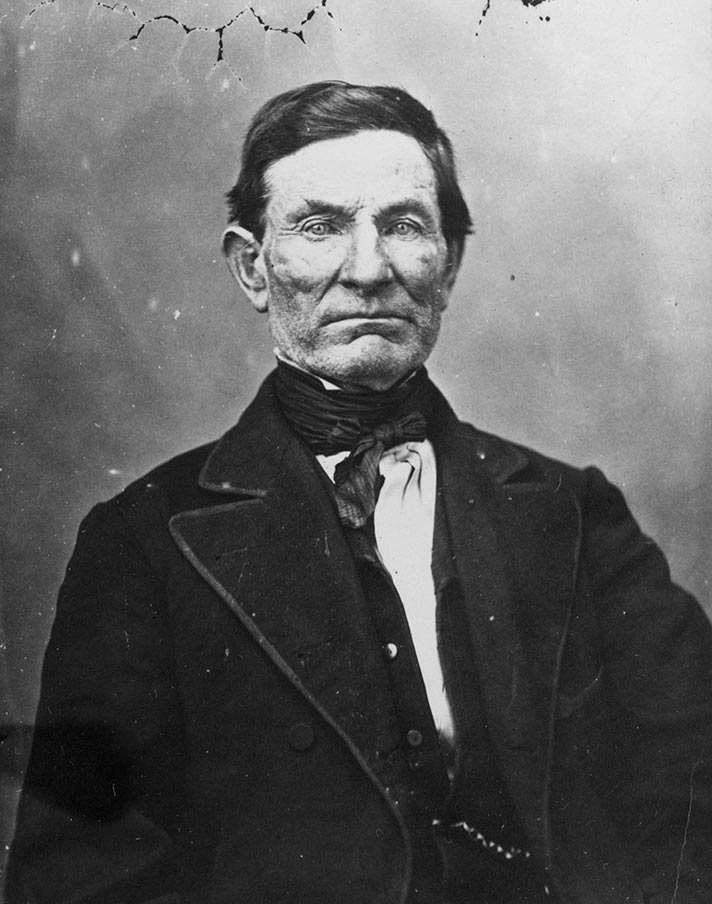Pioneer Profiles – July 2023
It’s been nine months since we parted company with William Green Hamilton T’Vault, aka TeVault or TeeVault, but that hasn’t prevented him from getting in trouble or reinventing himself. We’ll encourage you to go online and read the first two installments in the September and October 2022 editions of the Review.
In the meantime, here’s a quick refresher. We’ve traced his early legal career in Indiana and Arkansas; a marriage to the supposed “granddaughter” of Daniel Boone; a jail break following charges of rape and murder; an arduous trek across the Oregon Trail; resumption of a law career in Oregon City; increased involvement in politics; a very short-lived tenure as the Oregon Territory’s first newspaper editor; an equally short-lived religious conversion wherein he confessed to being “an adulterer, a gambler, a hard drinker, and a scoundrel”; and his disastrous exploits as an egotistical but inexperienced trail guide.
We left T’Vault in Southern Oregon in the spring of 1852. Following the discovery of gold, he had packed up his family and headed for the “Rich Gulch” country where he filed a donation land claim near what is now Gold Hill. He called it “Dardanelles.”
Although gold may have been Southern Oregon’s attraction, mining required too much time, concentration, and patience for T’Vault, what with hours spent digging in creeks and washing out pans of mud. When hundreds of miners appeared in the area virtually overnight, he soon realized their pockets were a better source of gold than creek beds.
He established T’Vault and Company ‘s Oregon and Shasta Express and Postal Service, providing service between Oregon City, Winchester, the Rogue River Indian Agency, Josephine Creek, Minersville, Humbug City, and Shasta Butte City (now Yreka, California). And although he had not deemed Postmaster for the Oregon Territory sufficiently lucrative, by December 1852 he had secured the position of first Postmaster in Southern Oregon—the third in the entire state. Since the post office operated out of T’Vault’s home, overhead was minimal.
There are two different versions of the next T’Vault story—one occurring in a mining camp while riding his express route; one occurring at an October 1852 bachelor party for Nat Dean, Jackson County’s first groom. In both versions, “sundry drinks” had made T’Vault “very lively.” Indians had recently been committing “deviltry” in the neighborhood and T’Vault proposed reprisal. With an “Arkansas yell,” he began a war dance, “squatting, pirouetting, waltzing, and jumping” while stripping off most of his clothes.
Spying an iron kettle, T’Vault decided it would add to his warlike appearance and provide a grand climax to his dance. It certainly did! It only took a moment to thrust it over his head, but in his frenzied exhibition, the pot slipped over his head and neck. Removing it was a different story entirely!
Attempts to pull it off were unsuccessful. One person tried freeing it with an ax at which point T’Vault asked for pen and paper to write his dying speech. T’Vault had always held himself in high esteem, but when a blacksmith was finally located who used the tools of his trade to free our subject, T’Vault emerged with an even more swollen head.
As tensions between Native Americans and White settlers escalated, open warfare soon broke throughout the Rogue River Valley. Settlements were threatened and homesteaders were in terror. Forts offered safety in numbers, and T’Vault’s home was quickly turned into a fortification. A stockade was erected around it, and, though lacking any creature comforts, it became a refuge for neighbors.
In 1853, T’Vault saw actual fighting in one of Southern Oregon’s Rogue River Indian wars when he joined his friend General Joseph Lane as an aide. T’Vault was put in charge of a division and no doubt followed any orders that Lane issued. Firsthand accounts of the battles fail to mention him, but T’Vault was among the wounded. A musket ball passed through his hand resulting in permanent partial paralysis.
A contemporary, Captain William Tichenor, states in his “Reminiscences,” “T’Vault’s reputation as an Indian fighter is both good and bad. In some cases, he conducted himself with skill and courage. It is reported in others he was cowardly and stupid.” Let’s just say that T’Vault had his strengths and weaknesses. Experienced explorer and master soldier were not among his strengths.
Although the “official” Rogue River Indian Wars took place from 1855 through 1856, by then T’Vault had relocated to Jacksonville, resumed his law practice, and been elected Jackson County’s first prosecuting attorney. Although authorized to raise a militia company, he interpreted the orders as “enrolling and mustering,” neither of which involved him fighting. Instead, he covered the Wars from a safe distance.
In November 1855, he published and edited the first issue of the Table Rock Sentinel newspaper. A critic noted, “Col. T’Vault is known as the first editor in Oregon; he is not known as the best.” However, the paper itself resembled other publications of the time. National news was lifted word for word from eastern papers. But when it came to local news and especially political contests, the idea of libel did not even exist, and vitriol and name calling were the norm.
T’Vault spoke for the Democratic Party of the time, voicing, often and eloquently, support for slavery and the “Southern cause.” Having spent his boyhood in Tennessee, he had been thoroughly indoctrinated. He wrote, “If I had one drop of abolitionist blood in my veins, I would cut it out.” In 1857, T’Vault’s Sentinel became the second newspaper to advocate for the introduction of slavery into what would become the new state of Oregon. The people disagreed.
In 1858 T’Vault was elected Jackson County representative to Oregon’s Territorial Legislature and was named speaker of the house on the first ballot. He reportedly conducted legislative affairs in a capable manner and introduced resolutions to establish a military post at Klamath Lake and tri-weekly mail service between Portland and Yreka. T’Vault also nagged the Legislature to pass a law that would permit slave owners to bring their slaves into the Oregon Territory, declaring, “The Constitution authorizes the holding of slaves in all Territories and the legislature cannot prohibit slavery.”
To dedicate his time to his political interests, T’Vault named one of his employees, William J. Robinson, editor of the Sentinel in his stead, at the same time changing the name of the newspaper from the Table Rock Sentinel to the Oregon Sentinel. Robinson was known to be “a sound, reliable, pro-slavery Democrat.” In the fall of 1859, T’Vault sold his interest in the paper to James O’Meara, who continued the paper’s pro-Southern policy.
But in 1861, the paper was sold to Henry Delinger and W.M. Hand, who were strongly Republican. T’Vault was deprived of his “bully pulpit.”
And then the Civil War loomed….
Final Installment: Promoting a Pacific Republic, the forerunner of the State of Jefferson movement.

 Chelsea Rose is an historical archaeologist who specializes in the settlement and development of the American West. Chelsea and the Southern Oregon University Laboratory of Anthropology (SOULA) conduct archaeology across Oregon and have done several projects in Jacksonville. You can reach Chelsea at rosec@sou.edu and follow SOULA on
Chelsea Rose is an historical archaeologist who specializes in the settlement and development of the American West. Chelsea and the Southern Oregon University Laboratory of Anthropology (SOULA) conduct archaeology across Oregon and have done several projects in Jacksonville. You can reach Chelsea at rosec@sou.edu and follow SOULA on